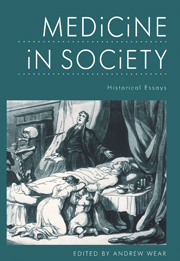Book contents
- Frontmatter
- Contents
- List of contributors
- Introduction
- Healers in the medical market place towards a social history of Graeco-Roman medicine
- Medicine and society in medieval Europe, 500-1500
- The patient in England, c. 1660–c. 1800
- Making sense of health and the environment in early modern England
- Medicine in the age of Enlightenment
- The rise of the modern hospital in Britain
- Medical practitioners 1750–1850 and the period of medical reform in Britain
- Public health, preventive medicine and professionalization: England and America in the nineteenth century
- Madness and its institutions
- From infectious to chronic diseases: changing patterns of sickness in the nineteenth and twentieth centuries
- Providers, ‘consumers’, the state and the delivery of health-care services in twentieth-century Britain
- The implications of increased life expectancy for family and social life
- Index
Medicine in the age of Enlightenment
Published online by Cambridge University Press: 13 January 2010
- Frontmatter
- Contents
- List of contributors
- Introduction
- Healers in the medical market place towards a social history of Graeco-Roman medicine
- Medicine and society in medieval Europe, 500-1500
- The patient in England, c. 1660–c. 1800
- Making sense of health and the environment in early modern England
- Medicine in the age of Enlightenment
- The rise of the modern hospital in Britain
- Medical practitioners 1750–1850 and the period of medical reform in Britain
- Public health, preventive medicine and professionalization: England and America in the nineteenth century
- Madness and its institutions
- From infectious to chronic diseases: changing patterns of sickness in the nineteenth and twentieth centuries
- Providers, ‘consumers’, the state and the delivery of health-care services in twentieth-century Britain
- The implications of increased life expectancy for family and social life
- Index
Summary
Introduction
Historical scholarship usually assigns the term Enlightenment to a period which began with the Glorious Revolution of 1688 in England and ended either with the 1776 Declaration of Independence by the United States, or the French Revolution of 1789. As a European reform movement, the new era witnessed a shift in values and social policy that profoundly shaped subsequent human history. Among the most prominent beliefs operative during the Enlightenment was faith in the progress and perfectibility of society with the help of science and technology. On the methodological front, the power of reason – variously interpreted as mathematical —deductive or sensualist —inductive —characterized the debates concerning human understanding.
A rejection of previous theological hierarchies and social constraints was initiated by Enlightenment thinkers under the banner of a desirable ‘ natural ’ evolution of the innate intellectual and moral tendencies of man. Finally, the condition of liberty as a right for the attainment of happiness and fulfilment was coupled with the principle of utility – greater benefits for the greatest number. Both constituted the fundamental pillars for the envisioned reconstruction of human institutions.
In health-related fields, the Enlightenment established a much more optimistic outlook concerning the role and benefits of medicine. In their quest towards progress, most contemporary thinkers believed that health was a natural state of the body which could be maintained and protected. In turn, they were confident that, eventually all diseases could be Eradicated.
- Type
- Chapter
- Information
- Medicine in SocietyHistorical Essays, pp. 149 - 196Publisher: Cambridge University PressPrint publication year: 1992
- 13
- Cited by

